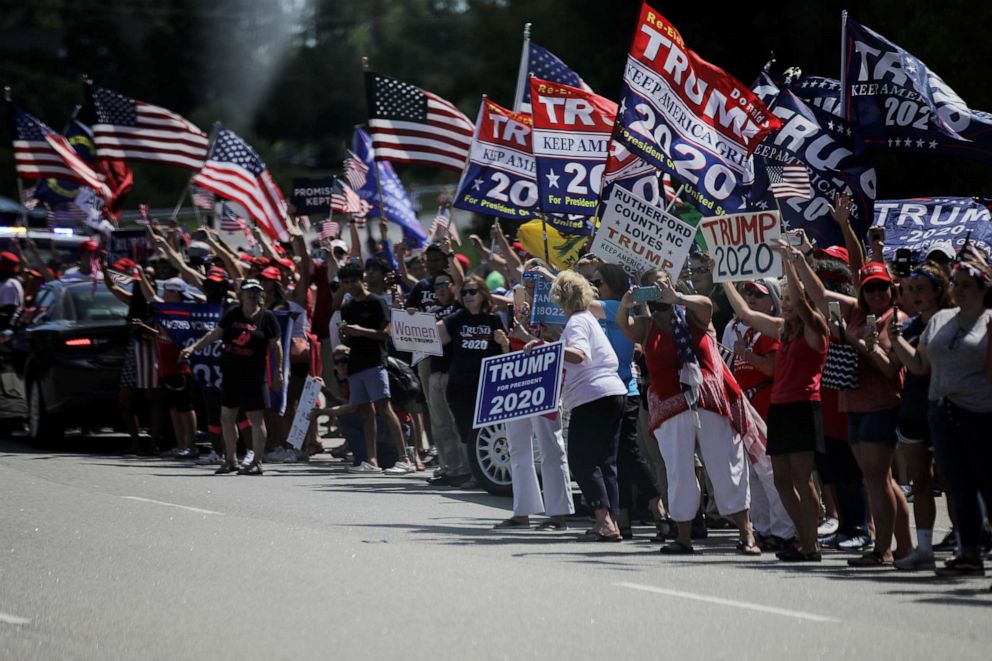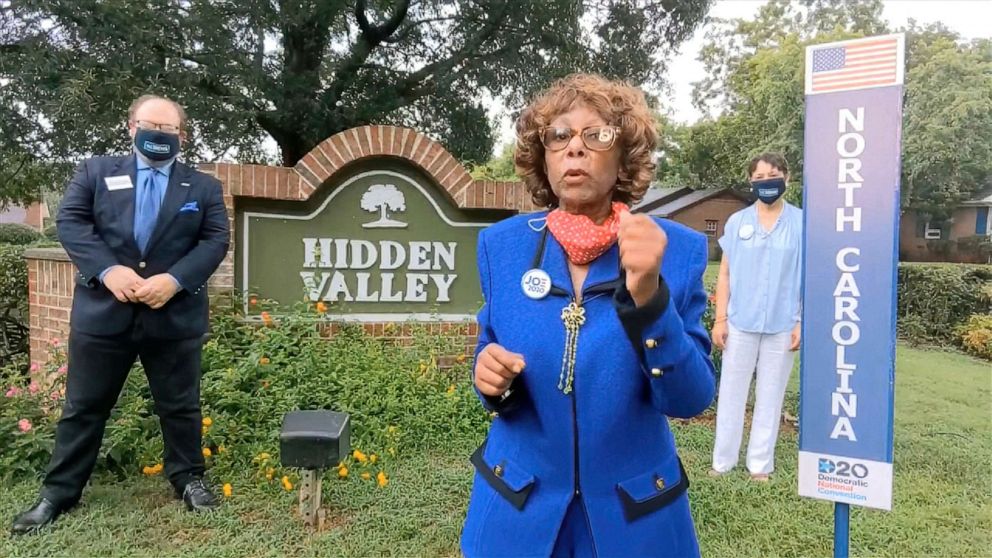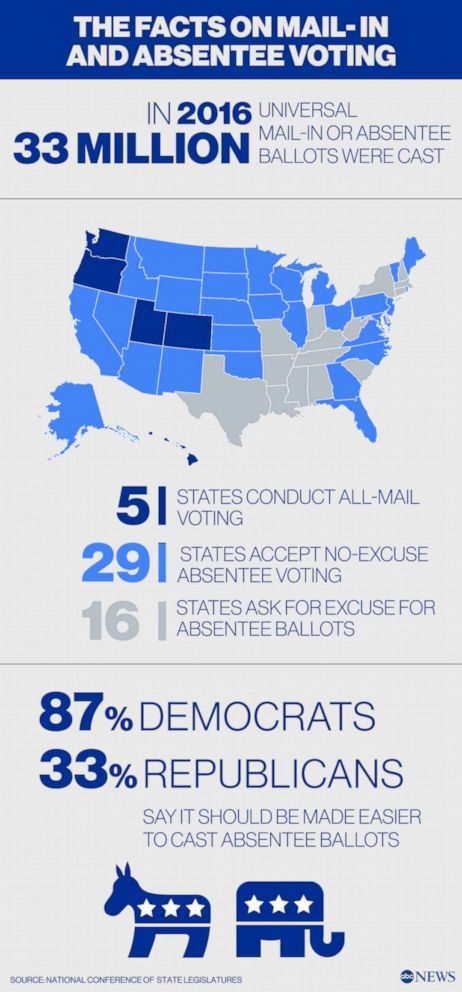North Carolina, 1st state to begin voting for president, sees record number of requests for absentee ballots
In two weeks, North Carolina will become the first state to send out ballots for the 2020 general election. The state will initiate the vote-by-mail process on Sept. 4, a full two months ahead of Election Day, by mailing ballots to eligible voters who have requested absentee ballots in advance.
As the COVID-19 pandemic forces states to expand their vote-by-mail options, questions about election security, potential mail delays and confusion over deadlines, as well as ballot rules, have some voters uncertain about whether or not their votes will be counted.
North Carolina offers multiple options to voters -- early in-person voting, absentee by mail voting and in-person voting on Election Day -- but voter advocacy groups say recent changes to the state's mail-in voting process are causing confusion among voters.
"We're seeing the prospect of a really dramatic change in the method of voting in the state," Tomas Lopez, executive director of Democracy North Carolina, told ABC News.
Election officials say the number of requests for absentee ballots is more than 10 times higher this year than at the same time in 2016. More than 313,000 North Carolinians have requested ballots by mail, compared to just under 28,000 four years ago. Registered Democrats account for 53% of the requests, with 31% unaffiliated and 15% registered Republicans.
"In the 2016 general [election], 4% of the population voted by mail; our election officials estimate we could have as many as 30 or 40% of the electorate voting by mail this fall," Lopez said.
After a lawsuit and political pressure to change mail-in voting rules, state lawmakers passed a law in June that included several changes for absentee voting.

Under the new rules, voters are allowed to request absentee ballots by email or fax. The legislation also called for the creation of a new ballot tracking system that will allow voters to follow their ballot as it is sent through the mail to the board of elections. Election officials are also now required to notify voters if there is a problem with their ballot and give them an opportunity to fix it.
North Carolina used to require two witnesses to vouch for a voter's absentee ballot, but that rule was changed so that only one is required.
Even requiring one witness during a pandemic has raised concerns and the North Carolina state Board of Elections has been forced to address concerns about the possibility of being exposed to the virus due to the witness requirement. The board has advised voters the witness may be socially distanced or through a window, and even advised voters could bring hand sanitizer, gloves or their own pen.
Officials with the NCSBE say they have also been responding to voter questions and concerns about mass mailings, text messages, calls and in-person visits by political groups. The board says these outreach efforts by third parties are legal, but can be confusing to voters and unsolicited contacts can erode confidence in elections.
"The state and county boards of elections encourage third-party groups to consider the overwhelming toll that misleading or confusing mailings and other outreach efforts take on election resources," said Karen Brison Bell, the NCSBE's executive director.
Bell encouraged voters who are concerned about the legitimacy of voter registration applications or absentee ballot request forms to discard them and download the forms directly from the state board's website.
"There is rarely anything we can do to stop these efforts. State and county election officials do not randomly call or text residents, nor do we go door to door to encourage individuals to register to vote," Bell said.

Among the groups mentioned in complaints to the NCSBE about a mailing was the Center for Voter Information, with one letter expressing concerns it is a "front organization for the Democratic Party."
A spokesperson for the Center for Voter Information told ABC News the group is nonpartisan, but acknowledged that the organization does target three main demographic groups that historically vote Democratic: people of color, people younger than 34 years old and unmarried women. The spokesperson said these groups were selected because they have been historically underrepresented in democracy.
The Center for Voter Information has sent out 2.3 million vote-by-mail ballot applications to North Carolina residents and 3.5 million voter registration applications.
"With COVID-19 impacting elections, we have a responsibility to do all we can to safely increase voter turnout amid this uncertain time," Tom Lopach, the president and CEO of the Voter Participation Center and the Center for Voter Information, said in a statement. Lopach also said the organization works with county and state election officials to ensure eligible voters are able to participate in elections.
President Donald Trump has spent months questioning the security of mail-in ballots, but recently changed his tone, encouraging his supporters in North Carolina to vote absentee on a telerally held earlier this month. The president himself voted absentee in the Florida primary just last week.
The North Carolina Republican Party has sent out absentee ballot request forms to various voters. The forms are similar to those third-party groups have sent and the mailer includes a picture of Trump's face on the envelope. The party clarified that the applications sent were absentee ballot request forms, not actual ballots. After receiving the form, a voter would need to send it in to receive a ballot.
"The North Carolina Republican Party is actively encouraging voters to utilize North Carolina's absentee voting process," North Carolina GOP press secretary Tim Wigginton said. "We've sent several statewide mailers to make it easier for interested voters to participate. We want our voters to know they can utilize this tool to cast their ballot in an easy, safe and secure manner. It is important to note that the North Carolina system requires a voter to actively solicit a ballot and go through an easy but important verification process to request a ballot."
Wigginton continued, "Do not confuse North Carolina's absentee system with other states' all-mail elections. We, along with President Trump, oppose an all-mail election process where voters are mailed ballots without a prior request and authentication. We, along with President Trump, support absentee voting systems like the one President Trump has utilized in Florida and we have here in North Carolina. We will continue to stand with President Trump to fight the schemes by liberal activists to weaken election safeguards and the universal mailing of live ballots without common sense safeguards which is what spoiled the primary in New York."
Elections officials have repeatedly disputed Trump's claims that mail-in voting will lead to more fraud.

In a statement to ABC News, North Carolina Democratic Party Executive Director Meredith Cuomo explained the significance of North Carolina's early voting.
"The NCDP has full confidence in the State Board of Elections and wants all North Carolinians to be able to cast their ballot in the safest and most convenient way for them -- whether that's voting by mail, voting early or on Election Day. Donald Trump knows that voting by mail is safe, secure and reliable, and that's why his campaign has been sending absentee ballot applications to voters in North Carolina. Trump and his henchmen casting doubt on the integrity of our state's voting processes is a disingenuous, shameful attack on our democracy," Cuomo said.
Issues with absentee ballots in North Carolina made national headlines during a 2018 midterm race for the state's 9th Congressional District. The NCSBE refused to certify the election after claims that Republican political operative Leslie McCrae Dowless had illegally manipulated ballots. Dowless was indicted on charges of perjury, felony obstruction of justice and possession of absentee ballots. The investigation into the election is ongoing and prosecutors say additional indictments could be filed.
The election was eventually held again in September 2019, with Republican candidate Dan Bishop winning.
North Carolina's 15 electoral votes are considered a toss-up in the presidential election. In 2008, Democratic candidate Barack Obama won the state by about 14,000 votes. Four years later, Republican candidate Mitt Romney beat Obama by about 2%. In 2016, President Donald Trump won the state with nearly 4% against Hillary Clinton.
In addition to the close presidential race, there are several close statewide races, including North Carolina's gubernatorial race and the Senate race between incumbent Sen. Tom Tillis and Democratic candidate Cal Cunningham.
Lopez said the increase in the number of absentee ballots could mean results take longer to finalize, but he hopes any potential delays won't impact voters' confidence in the process.
"One of the marks of success on Nov. 4 will be that if we are in a situation where we don't know results, that doesn't lead to a situation where people feel like the election is not legitimate or something has gone very wrong," Lopez said.



